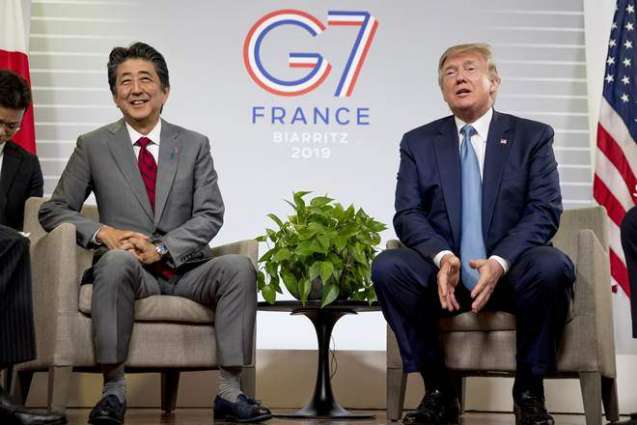The announcement of a US-Japan trade deal helped the two allies to ease tensions against the backdrop of unending US-China trade wars, but the agreement, at least the way it has been described so far, seems to hardly meet the expectations of either side, experts told Sputnik
MOSCOW (Pakistan Point News / Sputnik - 27th August, 2019) The announcement of a US-Japan trade deal helped the two allies to ease tensions against the backdrop of unending US-China trade wars, but the agreement, at least the way it has been described so far, seems to hardly meet the expectations of either side, experts told Sputnik.During the G7 talks in France, US President Donald Trump and Japanese Prime Minister Shinzo Abe announced that their countries had agreed in principle on the much-awaited trade deal, noting that it may be signed on the sidelines of the United Nations General Assembly in New York next month.
US Trade Representative Robert Lighthizer said the new deal would cover agriculture, industrial tariffs and digital trade. Automobile tariffs, which were the main bone of contention, would remain untouched, while the agreement would open up the Japanese market to additional $7 billion in agriculture exports, with beef, pork, wheat, dairy products, wine and ethanol benefiting the most, according to the US official.
While noting that there were little detail to draw any substantial conclusions, Jim Schoff, a senior fellow in the Carnegie Asia Program focusing on the US-Japanese relations and regional engagement, told Sputnik that the announcement helped to alleviate the tensions between the two allies.
"As for the announcement, it does help cool down tensions between them and takes the spotlight off of Japan ... The announcement itself shows how much each side is eager to have some kind of deal (for Trump so he can claim some agriculture success, and for Abe just to get Trump off his back for a few more months)," Schoff said.
June Teufel Dreyer, a professor of political science at the University of Miami, also noted that it was not "a done deal," but only a tentative one.
"You know the saying that 'the devil is in the details.' So something could happen to prevent the final signing," Dreyer stressed in her comments to Sputnik.
Dr. Victor Teo of the University of Hong Kong also did not rule out "adjustments down the line."
"In fact, I will not be surprised if Japanese negotiators would try their best to soften the blow by trying to renegotiate or adjust the deal quietly. This is to be expected. Besides who is to say that there won't be further developments down the line that will affect the dynamics of the situation," Teo told Sputnik.
Yet the agreement, as described by Lighthizer, could hardly be seen as a "good deal" by Japan, especially in terms of automobile tariffs that it reportedly asked to lift, Dr. Sayuri Shirai, a professor of Keio University, told Sputnik.
"Japan did not get a very good deal because US will not cut tariffs on cars imported from Japan. Also Mr. Trump has not clarified that he would not impose export restraints on cars from Japan. He also did not say that he would not impose 25% tariffs on Japanese cars and parts permanently," Shirai stressed.
The expert noted, however, that Japan still got "some wins" since the US did not impose an exchange rate clause similar to the one in the new NAFTA agreement.
"If US imposed the exchange rate clause, this could have triggered a further appreciation of the yen, which would reduce corporate profits of Japanese manufacturing firms as well as Japan's stock prices. Japanese manufacturing sector is weakening now due to reduced trade with China and Asia. The profits are dropping. So a further appreciation of yen must be avoided," she explained.
Yet the deal is not perfect for Trump either as the status quo on automobile tariffs, his "main obsession," seem to hardly meet his expectations, according to Dreyer of the University of Miami.
"So can't call this part a victory," she noted.
Yet, according to Dr. Teo of the University of Hong Kong, the deal seemed to be a big win for US farmers who were hit by the US-China trade wars.
"It is mostly a win for the United States. In agreeing to shell out actual money to buy agriculture products that the Chinese won't buy, Japan is acting as a 'buffer' to absorb the damages that Beijing has dealt to Trump's political base at home," he said.
Schoff noted, however, that Japan would hardly buy as much corn as the United States wanted it to.
"There is some added pressure now, since Trump talked about Japan buying 'all that [surplus] corn' ... which is about 40 million+ tons, and Japan probably plans to only buy about 2.5m tons in addition to what it normally buys," the expert explained.
The two allies showed signs of certain disagreement over the issue during a press conference on Sunday, when Trump apparently dismissed Abe's remarks that it was up to the Japanese private sector to decide how much corn to purchase, saying that the private sector in the Asian nation "listens to the public sector very strongly."
Yet, Schoff pointed out that if Trump heralded the deal with Japan as a "great victory," he would keep saying it even if the impact was less than he hoped.




